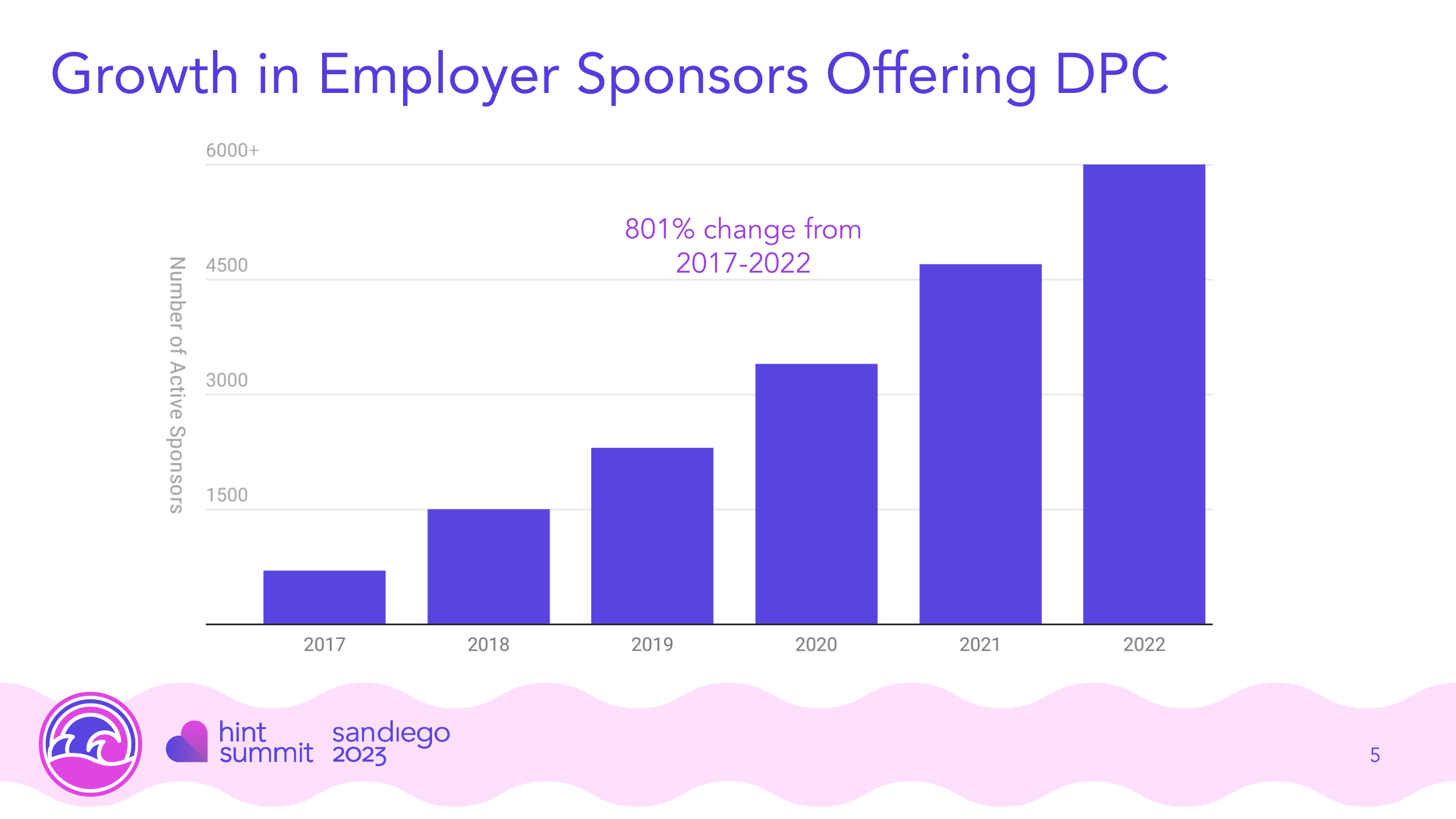At Hint Summit 2023, we presented key findings from the 2023 Employer Trends in Direct Primary Care Report and discussed the opportunities for growth in direct primary care (DPC) adoption amongst employers. The data source is Hint Health’s own which pulls trends from over 6,000 employer sponsors, 3,500 clinicians and 1.1+ million members from 2017 to 2022. The Trends in Employer Adoption panel at Hint Summit featured panelists, Ben Aiken, MD, Founder, CEO & Family Physician at Lantern Health and David Contorno, Founder & CEO of E-Powered Benefits with Ji Xiao, Sr. Network Development Manager at Hint Health.
Ji begins by showing the 801% rate of growth of employer sponsors from 2017 to 2022 and asks the panelists what they’ve seen in the market. David Contorno remarks that every one of their health plans includes DPC and while there is some hesitancy since people do need to switch their primary care providers to work with the plan, it has turned out to be very high satisfaction after the change.

“Every single person is rating a 90-plus NPS score for the DPC plan. They appreciate the relationship they have with their doctor.” - David Contorno, E-Powered Benefits
Ben Aiken, MD notices that there is more awareness about DPC amongst employers today than there was five years ago when he first started his practice with one employer sponsor. With traditional health plans continuing to rise in cost and employers facing an increased financial burden to offer healthcare coverage to their employees that don’t even translate to improved outcomes, employers are looking for alternatives. The “status-quo” plans are simply not sustainable and businesses need and want effective and affordable health plans to offer their staff and direct primary care at the center of plans is an attractive solution.
In light of this, David Contorno anticipates that demand for direct primary care will continue to grow amongst employers, but that the supply side will lag because there is not a sufficient number of doctors going into primary care. David is hopeful however that the rise in demand for DPC will encourage the growth of the supply side of providers. Dr. Ben Aiken acknowledges that more of a commitment from employers and overall demand for DPC “eases that transition for generally very risk averse doctors.”
Ji cites another important finding from the 2023 Employer Trends Report, that about 45-50% of DPC providers are working with employer sponsors and it has been holding steady the past two years. David comments that he notices a hesitancy on the part of DPC clinicians to work with employers because of fear that it may interfere with the way they deliver care and are compensated. DPC clinicians also don't want to ramp up staff and service capacity for an employer and lose that business down the line.
Employers need to understand that when you put BlueCross or United or Cigna in the middle [of the doctor-patient relationship], you’re not just putting one layer in the middle, you’re putting three, four, five, six layers in the middle and you are not only taking away from the outcomes of that patient, but you’re adding to cost. - David Contorno, E-Powered Benefits
David goes on to state how essential it is for healthcare to return to the foundational principles of honoring the doctor and patient relationship without the interference of third parties dictating how and what kind of care should be delivered. When the clinician and patient relationship is honored, not only does quality of life improve, but costs go down.
Ben Aiken, MD chimes in on his practice’s early and ongoing efforts to engage with employers and he admits that it does take more work to successfully sell to and retain employer clients. When DPC is paid for on behalf of patients by their employer, they may not be as engaged as a retail client and employers want to see the value that they are getting as well as certain reporting on a regular basis. This effort however, has been worthwhile for Dr. Ben Aiken’s practice, Lantern Health who has been getting consistent referrals from businesses all via word-of-mouth.
“About 55% of our patients come from businesses, and a testament [to] that growth is that I’ve done zero marketing in the last 24 months to employers.” - Ben Aiken, MD, Lantern Health
Watch the panel discussion and download the report to get deeper insights on retention, employer industry segments, and a Q&A that reveals how best to navigate brokers and employer relationships to successfully contract with and retain employers.
Connect with the speakers to engage on DPC adoption amongst employers.
Ji Xiao: LinkedIn | Hint Connect
David Contorno: LinkedIn | E-Powered Benefits
Ben Aiken, MD: LinkedIn | Lantern Health

